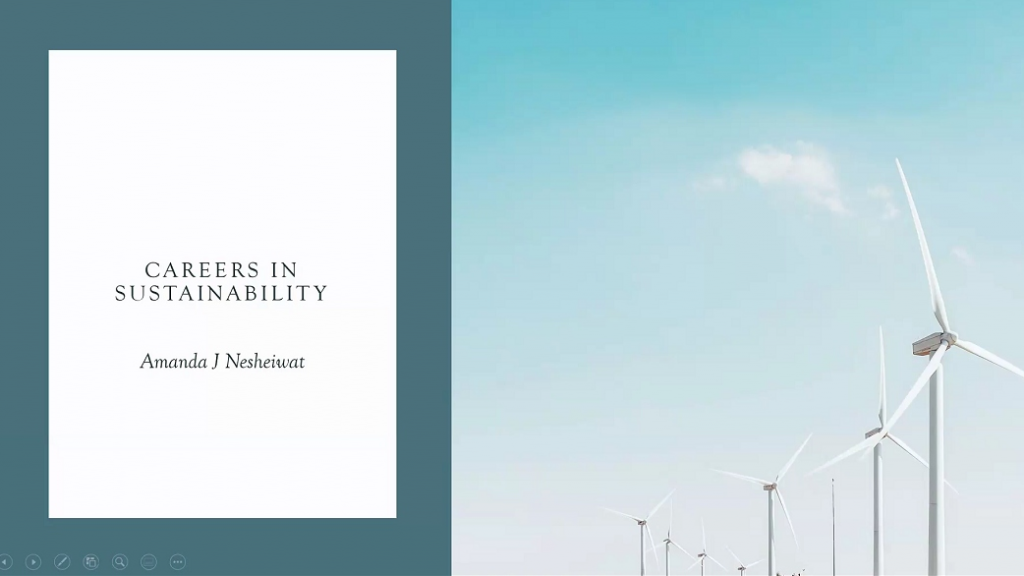
Photo by Danielle Bongiovanni
On March 9, Amanda Nesheiwat was invited by Ramapo’s Sustainability Committee to present "What It Takes to Be a Sustainability Professional." She graduated from Ramapo College in 2012, teaches Environmental Studies as an adjunct professor, and has over a decade of experience working in the field.
Nesheiwat began by describing her journey to her current position as the Deputy Director of Sustainability and Community Outreach at Hudson County Improvement Authority. She started off as a student at Bergen Community College, then majored in Environmental Studies at Ramapo College.
“I owe a lot of where I am right now and my career to Ramapo College,” she said. She directly thanked Dr. Vasishth for his support and guidance.
The start of her career as a sustainability professional began in college. While living in Secaucus she asked herself, “Why don’t I just help my community?” One email to Mayor Michael Gonnelli about making the town more sustainable earned her a meeting with him within a week. He invited her to become the chairperson of the environmental committee. Soon after, he offered her a part-time job organizing that summer’s Green Festival.
For 10 years, Nesheiwat worked as the Environmental Director of Secaucus. Her accomplishments include implementing a ban on styrofoam, creating community gardens, organizing energy audits on municipal buildings, and earning the highest recycling rate in Hudson County.
Since May of 2020, she has transitioned to working for the Hudson County Improvement Authority. She manages projects such as creating a successful sustainability department for the county, creating sustainability goals based on local data, reaching out to community organizations such as environmental clubs, and collaborating with the county engineering and planning departments to create a climate action plan.
The latter is particularly dear to her, she explained. “In government, it’s impossible to achieve something if you don’t have an action plan to do so.”
Despite her impressive resume, Nesheiwat remained humble. “I didn’t know how to do any of this when I first got the job,” she said about her time working with Secaucus, but a combination of “winging it” and asking for help allowed her to succeed.
She advised college students to follow her example and attend as many sustainability events as possible. “My goal really was to learn what I could there, to get some contacts… and this has been one of the biggest contributions to my sustainability career,” she said.
She related to those who struggle with anxiety and imposter syndrome but encouraged them to leave their comfort zones. “The things that I’m most afraid of, I should probably be leaning into, because maybe that’s where I’ll find myself,” she stated as her motivation for participating in UN panels, marches, and other opportunities to practice her public speaking skills.
Nesheiwat used a segment of her presentation to recommend organizations, programs, and certifications she had either worked with or participated in that she believes any young person interested in sustainability should pursue. Virtual programs like the Climate Reality Leadership Corps can help people improve their communication skills and provide pathways to future opportunities to work with organizations looking for sustainability professionals.
Nesheiwat advised, “Apply to whatever interests you… You’ll figure it out, you will.”
Nesheiwat also stressed the importance of filling one’s personal life with meditating, journaling, exercising, and reading. She liked the book Lean In by Sheryl Sandberg because it was filled with statistics and case studies describing women’s experiences in workspaces.
She advised students interested in making Ramapo College more sustainable to assess their own skills and what projects the campus might support. She encouraged them to ask, “What do we need and what can I do? Let’s figure it out from there.”
Nesheiwat left her audience with one of her favorite quotes, “Being effective makes you successful.” Being effective meant putting yourself first and trying to be the best fit for the job you wanted. “No matter what, if you’re good at what you do, you’re going to succeed in your career… it should be your mantra" she added.
Students interested in talking further with Nesheiwat can reach her at amandanesheiwat@gmail.com. Her TEDx talk, Why I became a Change Agent, is available on YouTube.
dbongiov@ramapo.edu





